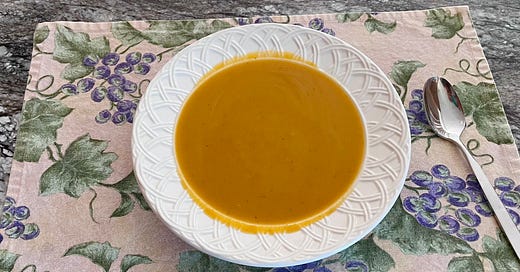At church this week, our closing song surprised me: “They’ll Know We are Christians By Our Love.” Not part of our usual rotation, the song brought back memories of worship services at an evangelical Christian summer camp in Wisconsin—sitting on a wooden bench of a small amphitheater built into the hillside, singing with my cousin and other cabinmates. The song has a repetitive chorus and a 60s folksy vibe. It’s also known as “We are One in the Spirit,” another of its oft-repeated lyrics.
There’s a line that catches in my throat: “and we pray that our unity may one day be restored.” As lovely as that sounds, I don’t have a lot of confidence that will happen. I sang it, the words flowing from long-buried memory stores in my brain, but I wondered. Can unity ever be restored? Did it ever exist? I cling to faith, but I don’t know if my faith is strong enough to believe that unity, in our country or in Christendom, can happen.
It feels impossible in today’s deeply divided culture. Also, will they know we’re Christians by our love? These days, more than ever, some of the most vocal Christians are not know for love. They’re known for what they oppose. And it’s a lot. And even if I think I’m arguing on the side of love, as an ally of the marginalized, I’m kind of mad about it. Do I love those with whom I disagree?
Self-awareness hits me in the solar plexus, takes my breath for a moment. What would it look like to love those I disagree with politically? To give up trying to shame people into being more loving? I find myself on the verge of panic sometimes, just reading the news. It would be easy to give in to despair, or ranting critique. I want to demand that others be more loving, which is not loving at all on my part.
What if the move toward becoming “one in the Spirit” looks very much like a step toward Love? Not a warm fuzzy feeling, but action. Love, if we are to be “known by” it, must be visible, outward, demonstrable. It must be loving action, not just loving feeling.
The song brought back memories—good ones, of a loving church community, of going to camp, of going camping with families from our church and singing around a campfire. Of the joy of those innocent days of young faith. Naively, I thought we all did get along. (It was 1972. We did not all get along. Read your history books or Google Watergate, Vietnam, Civil Rights, etc.)
How can I, as a Christian, be known by my love? Although I really don’t identify as evangelical any longer, I do try my best to follow Jesus. I just can’t give him up. Despite the vitriol of some Christians, he taught us to love, to show mercy, to be peacemakers. His way appears to be the way of Love; he speaks with the voice of Love. His patience is deep. I want to be known by my love—and I do think that if I have any capacity to love, it comes from the Spirit.
I think of course (you could have seen this one coming) that one way we demonstrate love is to welcome others. Welcoming our neighbors feels to me pretty much the same as loving them.
Welcoming outside our homes
Welcoming can mean opening your home or table to others. But I’m discovering that I can practice hospitality without having to have anyone over.
Now, I told you last week that I’m taking a hospitality sabbatical, in that, we don’t have someone sharing our house at the moment. We of course still have people over, but just not living here with us. It’s been blissfully quiet. And so far, we haven’t opened the door to let anyone else live with us, so that’s going well.
But we’re still open to finding ways to love our neighbors, as a daily practice, a way of life. Loving my neighbors often means, in my world, cooking for them. (To nourish them, not to entertain or impress them!) It also means simply listening, being kind, holding space. Sending an encouraging text or email. Being present.
I want to offer you two ways to welcome others, without inviting anyone into your house. Because welcoming people is welcoming Jesus, and it is, I believe, part of a life-giving way of life that all of us are looking for. It is a step toward being known by our love.
First, Jesus said, “I was sick and you looked after me.” Visiting and caring for the sick was one of six ways Jesus said we should practice charity. He said when we feed the hungry, give water to the thirsty, welcome the stranger, clothe the naked, care for the sick, and visit the prisoner, it’s as if we’re doing those kindnesses to him. (See Matthew 25)
So one way to practice welcome is to visit the sick. To look after them, which to my mind, means visiting them but also feeding them or the people that live with them.
Tuesday was a rainy, cool, cloudy fall day. A perfect day for making soup—especially my favorite, butternut squash soup. (Recipe follows.) Butternut squash soup is like fall in a bowl. When the weather shifted from hot to, well, more fall like, I was 100 percent here for it, soup pot at the ready.
A dear friend (we’ve known him and his family for nearly three decades) just came home from Shirley Ryan stroke rehab center. Two months ago he suffered two strokes. He was a perfectly healthy, athletic 62-year-old. Until he wasn’t. He’s still got a long road ahead of him.
I brought his family a meal: pork tenderloin, potatoes, and soup. I made the soup ahead of time, and prepped the pork and potatoes, which I popped in their oven to cook. The good news is this soup can be made both gluten and dairy free, so my friend’s entire family can enjoy it. (Even though my friend is still not able to eat. Strokes suck. But he thanked me profusely for caring for his family and for spending time with him.) I sat and talked with him while the house filled with the smell of good food.
Want to practice welcoming without ever having to invite anyone over? Bringing meals to friends who are sick or hurting offers the perfect solution. I’ve written about this before (read it here).
But I’ve also been wondering: will people know I’m a Christian by my love? I mean, my friend’s family will. But how about others? Will the people I interact with on social media know I’m a Christian by my love?
And so, second, I consider what it would look like to welcome others in my interactions with them online. I resolve to shift toward love. To notice and name the good things, to spread joy instead of complaints. To bless rather than critique or catastrophize. To do simple things with love.
This has an added benefit of calming me down, frankly. The political rhetoric is running a little hot, and I get stressed just reading headlines. How can I be a calming influence, a welcoming presence, in the online space?
I recently wrote a book about overcoming fear: Live Like a Guide Dog. Co-written with Michael Hingson, it’s his story of walking beside eight different guide dogs. He wanted to write it because he saw so many people giving in to fear, especially in light of our political divisions, both inside and outside of the church. We are not “one in the Spirit” these days, either as a country or as believers. But the book offers clear ways (wrapped in inspiring dog stories) to turn our fear into courage.
It takes a certain amount of courage to put down my phone, to let go of worry, to find the line between being informed and being triggered. How can I love my neighbors, and love myself? How can I share joy and beauty in these fraught times?
Who in your life needs you to bring them a pot of soup? Or send them an encouraging text? Who needs to see a post from you that just celebrates beauty and the good? What if the people you connect with online need to be reminded that beauty still exists, right in front of us? What is one concrete action you can take this week to let people know you’re a Christian by your love? Maybe it’s as simple as making soup, and being kind.
P.S. Want more soup recipes and inspiration? My friend Kathi Lipp has a new book out: Sabbath Soup. I’m excited to get this book and try some of the recipes. I also love the concept—weekly meal plans to give yourself a day of rest once a week! My regular readers will know how much this resonates with me!
Butternut Squash Soup
1 large butternut squash
1 shallot, diced
1 apple, sliced very thin
2 T. fresh sage or 1 T. dried
1 32-oz carton chicken or vegetable stock
1 T. butter (or oil if dairy free)
1 t. nutmeg
½ t. mace
½ t. chili powder (optional)
1 t. salt
½ t. pepper
1 T. brandy (optional)
1 T. honey
Salt and pepper to taste
Cream or half and half (omit if dairy free)
Poke squash with a sharp knife, microwave for about two minutes. This will make it easier to cut.
Cut squash in half, scoop out the little pocket of seeds, put it cut-side down in microwave safe dish with half inch of water, cook until partially cooked, enough that you can easily peel away the skin and cut into chunks. A large squash takes five minutes or more. (You can do this in the oven the same way but it takes longer).
While squash is cooking, heat butter or oil in large stock pot, then sauté the shallots for four or five minutes over medium high heat. Add a pinch of salt to the shallots. When they start to soften and get brown on the edges, add apples and sage, lower heat to medium and continue cooking for five minutes or until the apples get soft.
Add stock, then squash. Simmer at a low boil to continue cooking the squash.
Using a stick blender, puree the soup carefully. (If you don’t have a stick blender, you can very carefully pour the soup into a blender in batches. But seriously, you should have a stick blender—here’s a link to the one I’ve used for more than a decade.
Add spices, honey, and brandy, if using. Taste and adjust seasonings.
Let soup simmer for 10 minutes on medium low to blend flavors.
Just before serving, add about a quarter cup of cream or half and half, if using.
p.S. This post contains affiliate links. If you click and buy, I get a small commission at no additional cost to you. Thanks for supporting this free publication in this way.








You also know this old Army Green Beret that insists it is the only way to lead. Lead with Love.
I still think of that song!